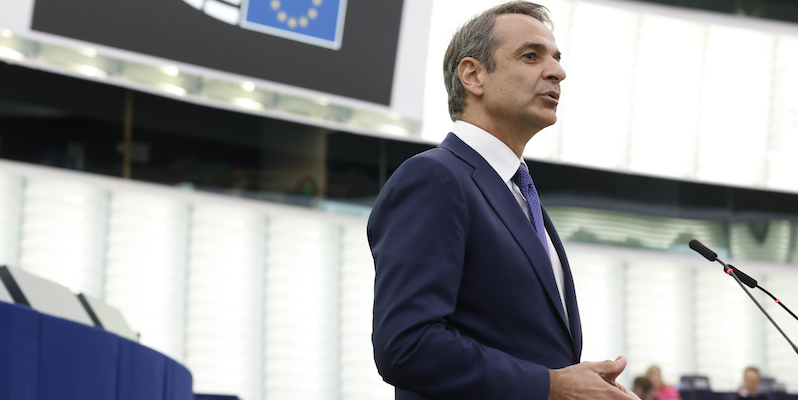Center-right Greek Prime Minister Kyriakos Mitsotakis tried to clarify on Monday with a televised message his position and his government’s position on a serious political espionage scandal involving him last week after Nikos Androulakis, the leader of the Socialist Party, reported that he had been intercepted for months by the Greek secret services.
On Friday, the chief of Greek intelligence and the prime minister’s secretary general (ie one of Mitsotakis’ main collaborators, as well as his nephew) resigned, a move that was seen as an admission of guilt. The secret services in Greece depend directly on the office of the prime minister, by choice of Mitsotakis: it was one of his first acts of government. The espionage of a political rival has therefore quickly become an important case, which is endangering the government. Mitsotakis defended himself by claiming he knew nothing, and blaming the services.
Androulakis, MEP elected head of the Socialist Party (PASOK) in December 2021, said he was warned by the European authorities that his phone had been checked with the Predator malware, a software that not only allows access to conversations, also encrypted, but which can activate audio and video recordings to spy on who is using it. It is an advanced and very expensive technology, hardly available to private individuals, but used by government secret services.
The denunciation of Androulakis, head of the historically rival Mitsotakis New Democracy party and now the country’s third force, he followed those of two Greek journalists, in turn spied on by the government: one works in the field of financial news, the other deals with migration.
After an initial attempt to deny involvement, the responsibilities of the secret services became clear. Some government sources have admitted that Androulakis’ phone had been brought under control, but at the request of foreign secret services, which according to the Greek press are those of Armenia and Ukraine. The Greek media sources also speak of connections with China, but these explanations were immediately considered weak and shaky, not least because it is not clear why the Greek services should spy on their own citizen on behalf of other countries. Armenia and Ukraine have already denied your involvement.
The government’s first response on Friday was the resignation of the head of intelligence (EYP) Panagiotis Kontoleon and Grigoris Dimitriadis, his general secretary and considered his first assistant. The resignation did not calm the controversy: the main opposition party, Syriza, has called for the resignation of Mitsotakis.
In his televised message on Monday, Mitsotakis denied any personal involvement, said he learned of the spying on Androulakis only a few days ago, and that the control of his phone had begun before Androulakis became head of PASOK. He called the secret service operation “formally and legally adequate, but politically unacceptable”. Mitsotakis also announced a reform of the secret services, with greater control and transparency.
The explanations have not convinced the opposition and a large part of public opinion, but it is not yet clear whether the scandal will lead to a crisis.
Although New Democracy is permanently the first party by consensus in Greece, Mitsotakis will face a complicated electoral campaign for re-election next year, difficult also under the new electoral law, which will hardly allow New Democracy to reach the majority even in the event of electoral success.
–


